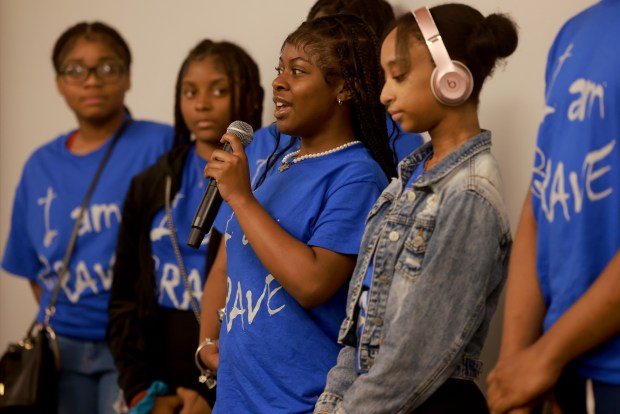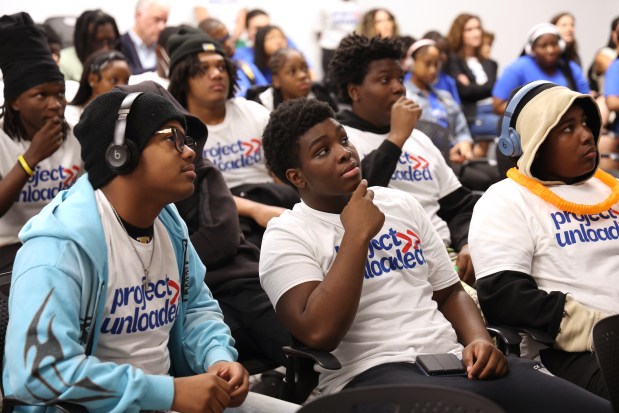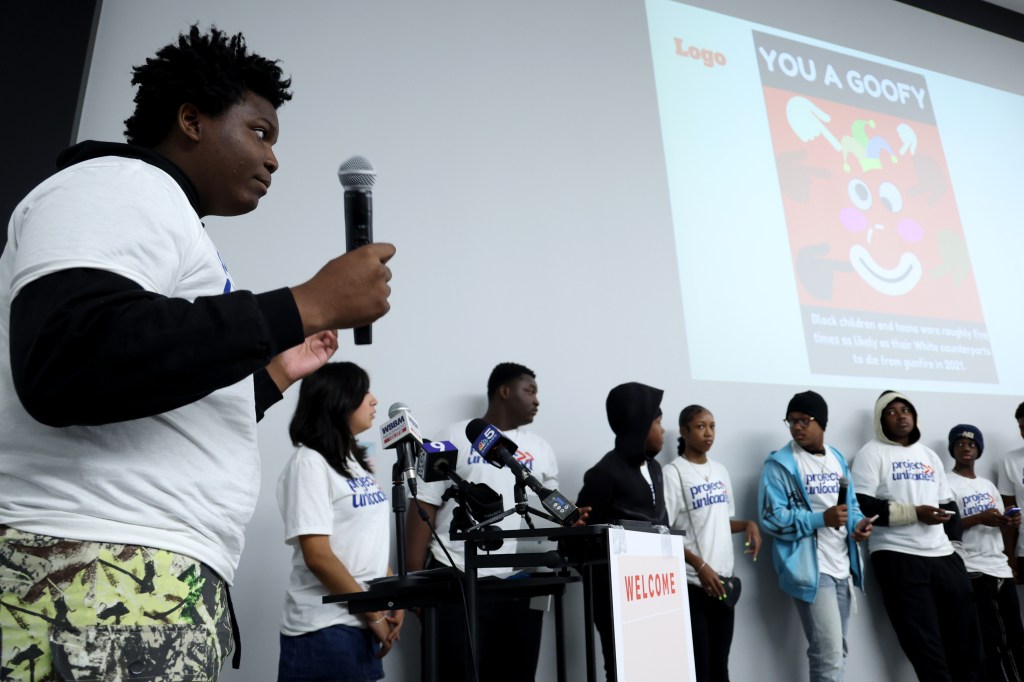Naperville resident and civil rights attorney Qasim Rashid said he was 16 years old in 1999 when the Columbine High School mass shooting took over a dozen lives. At the time, Rashid said he thought something like it would never happen again.
“That’s kind of what we all thought; it was a one-time thing,” Rashid said to a group of youth and adults at a downtown advertising agency last week. “(We thought) the folks in power are smart enough to figure out how to make sure this doesn’t happen again. Obviously, we were horribly wrong.”
Twenty-six years later, dozens from Chicago’s youth organizations came together to pitch social media campaigns to judges including Rashid — with backgrounds in education, public safety and social media — in an attempt to get one placed in a national promotion to change the narrative around guns and the violence they can cause.
The initiative is a competition that’s part of Project Unloaded’s third annual summer program, “Social Media for Safer Communities.” Project Unloaded is a nonprofit founded in 2022 by Nina Vinik that aims to empower teens to share facts about gun risks with one another to save lives. The project is funded through foundation grants and individual donors. Modeled after the Truth Initiative, which worked to change youth attitudes about cigarettes, Vinik wants Project Unloaded to help shift the attitude on guns with data and peer messaging via social media.
“The target for our digital campaigns is 13- to 17-year-olds,” she said. “That’s a critical decision-making period for young people when it comes to the decision either now or in the future to use guns. We need a reset to shift this idea that a gun is going to make me safe, to the idea that a gun is going to put me at greater risk. We do that by leveraging the power of social media and the power of Gen Z to change the narrative when it comes to gun use.”
Vinik said by meeting teens where they are, creating safe spaces for them to have conversations with each other about why guns are not going to make them safer and empowering them with information to make conscious decisions, youth learn to be agents of positive change in their communities and online. These conversations took place amid the backdrop of recent shootings this summer — a house party shooting in Harvey that left seven people injured, including a 4-year-old, a 17-year-old girl fatally wounded after being shot while traveling through Englewood and the River North shooting of 18 people, four of whom were killed.
More than 50 teens, spread across three teams from youth organizations After School Matters, Al Raby School for Community and Environment, Breakthrough Urban Ministries and The Ark of St. Sabina spent six weeks researching, collaborating and being mentored on social media from staff at the ad agency Havas Chicago to craft their social media campaigns and hone their anti-gun violence pitches. A range of TikTok-esque videos were shown sharing information that could sway young minds: from 1 in 5 people in Chicago own a gun, to 3 million children witness gun violence every year, to raps showcasing how fast actions mete out consequences. Five judges evaluated presentations on criteria such as impact, creativity and content.
The winning campaign was “You a Goofy” from the Breakthrough/After School Matters group. It seeks to engage 20,000 Chicago teens when it goes live around the start of school. The team defines a goofy as someone gullible, easily influenced, a follower. In layman’s terms: “owning a gun means you a goofy.” With videos and the hashtag #youagoofy, the team suggested online influencers like Korporate, Lil Baby and Kai Cenat to assist in the social media promotion.
Lauren Brown, 14, a student at Kenwood High School and Kingston Tate, 15, a student at Urban Prep, were a part of the winning team. While Brown found the presentation of their winning campaign the hard part, Tate said it was the consensus of one idea among his team that was the most challenging.
“I was in strategy, I came up with all the trends,” Tate said. “With all the freedom we had, it was hard to just choose one thing. The most fun was coming up with the ideas, seeing everybody collaborate. It was all from the heart.”
 Mikivrah Harris speaks with the team from St. Sabina during the Project Unloaded competition on Aug. 1, 2025. (Antonio Perez/Chicago Tribune)
Mikivrah Harris speaks with the team from St. Sabina during the Project Unloaded competition on Aug. 1, 2025. (Antonio Perez/Chicago Tribune)
Judge and Project Unloaded board member Erika Soto Lamb, VP of Social Impact for Showtime/MTV, commended the winning team on its use of comedy in conveying their anti-gun message.
“We should be listening to you,” Lamb said. “Comedy is a force for helping people think differently. The use of comedy to create change is something I know is really effective, that makes content more viral, more shareable. The message ‘you a goofy,’ … we’ll have more success in reaching the young people we want to reach with that message.”
Judge Jadine Chou, former Chicago Public Schools Chief of Safety and Security, said the “Goofy” campaign, complete with social media posts, videos was very memorable and creative. “I think a lot of young people would relate to using terms that young people think are funny. I learned from working with Chicago Public Schools is what we think is not what’s going to make the difference; it’s what you all think. You are the ones who are controlling our futures.”
The gun violence work continues year-round for Project Unloaded, new community campaigns work with older digital ones in a feedback loop of sorts, according to Olivia Brown, Project Unloaded’s community partner program manager. Since its first campaign SNUG, the program has seen shifts in teen views against gun ownership. While homicide numbers are down, the cause of death for the majority of homicide victims in Chicago is due to gunfire. Chicago data from Jan to August 2025, shows 31.5% of fatal and nonfatal shooting victims are aged 20-29 and 18.4% are younger than that. And 74.5% are Black and 18.8% are Hispanic.
Prior to summer programming, Project Unloaded launched a recent initiative centered on gamers, “Leave Guns in the Game.” Brown has been engaging young gamers in conversation online, knowing that young people, especially young men, learn about guns from games. She says the response has been positive. Changing students’ minds about guns is the biggest challenge when it comes to working through the program’s curriculum with student participants every year.
“They are taught so much about guns, not all of it is true — they watch so much TV, listen to so much music that glorifies or validates gun ownership,” Brown said. “What’s most rewarding is being able to sit with them and have conversations in a way that says ‘What if we considered something different?’ To cut through all of that programming, it does pay off. Once you land on ‘I don’t need a gun to be safe, guns are adding risk to my community,’ then we can have fun, create campaigns that take that understanding and make it something meaningful. Getting to the place of shared understanding in the room is the heart work — not the hard work.”
 Teens watch as anti-gun violence social media campaigns are presented at the Project Unloaded competition on Aug. 1, 2025. (Antonio Perez/Chicago Tribune)
Teens watch as anti-gun violence social media campaigns are presented at the Project Unloaded competition on Aug. 1, 2025. (Antonio Perez/Chicago Tribune)
Desmond Patton, an advisory board member of Project Unloaded and professor at the University of Pennsylvania who studies social media’s impact on violence for youth and people of color, said he hasn’t found another organization that is using this type of campaign-driven effort to combat gun violence.
“I think that’s something really innovative,” he said. “Project Unloaded understands social media as a neighborhood where critical dialogue and engagement and influence happens … (it) has been really great in tapping into the expertise of individuals that are most impacted and trying to understand how and if they want emerging technologies in their lives to solve these problems.”
